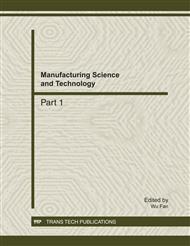p.4742
p.4748
p.4755
p.4762
p.4768
p.4775
p.4783
p.4787
p.4792
An Improved Particle Swarm Optimization Approach for Temperature Control in HVAC for the Purpose of Energy Saving
Abstract:
Good dynamic performance of a system have great significance in the traditional sense, furthermore,it is more important at the point of energy saving. Particle swarm optimization (PSO) is a novel evolutionary algorithm which has a better convergence rate and computation precision compared with other evolutionary algorithms. In this paper an optimal design of PID controller based on particle swarm optimization approach for temperature control in HVAC is presented. The results show the adjustment of PID parameters converting into the optimal point and the good control response based on the optimal values by the PSO technique, and thus it achieves the purpose of energy savings.
Info:
Periodical:
Pages:
4768-4774
Citation:
Online since:
November 2011
Authors:
Price:
Сopyright:
© 2012 Trans Tech Publications Ltd. All Rights Reserved
Share:
Citation:


